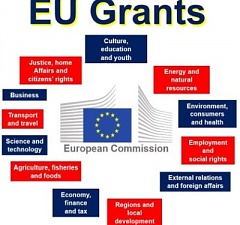Estonia, EU – Baltic States, Financial Services, Good for Business, Markets and Companies
International Internet Magazine. Baltic States news & analytics
Tuesday, 24.02.2026, 12:29
EU grants have increased productivity of Estonian businesses
 Print version
Print version |
|---|
Altogether some 900 million euros in monies of the European Regional Development Fund are to be directed into business and innovation related developments and increasing the competitiveness of regions in Estonia in the years 2014-2023, which comes in the form of direct grants, indirect support services, and measures to make the economy more knowledge intensive more broadly.
The analysis to evaluate the effect of the business and innovation subsidies financed from the EU Structural Funds was carried out by the University of Tartu and Tallinn University of Technology. The assessment was conducted in the period from July 2019 to May 2020.
"When it comes to support directed directly to businesses, business operators had a high opinion of both the appropriateness as well as the effectiveness of the support," said Karin Reiska, adviser on external support at the state budget department of the Ministry of Finance.
"It's a pleasure to see that the analysis by experts confirmed the attainability of the objectives of the business and innovation support and their positive impact on the economic indicators of businesses," she said, adding that as a result of the assessment, the ministry received good recommendations on what and how to change in the provision of services to boost their efficiency.
The report was completed at a time when COVID-19 had already had an impact on businesses, primarily on tourism and catering companies. In that field, the experts recommended to help businesses survive the first shock, to improve the availability of financial instruments and stimulate demand for innovative products and services.
The head of the evaluation, Siim Espenberg, director at the Center for Applied Social Sciences (CASS) at the University of Tartu, said that the results vary by field of activity.
The measures in the fields of research and development, innovation, smart specialization and creative economy rather contributed to the productivity of labor and increase in value-added. In the case of developing incubation in creative economy, the growth in value-added per employee was 2.8-fold on the average.
The biggest boosts to employee numbers were given by the measures directed to starting businesses and small businesses as well as those supporting regional development and tourism. Support for the management of the development of tourism products increased the numbers of employees by approximately 18 percent. The effect of EU support on the productivity of assets was biggest in creative economy and regional development subsidies.
The evaluation of the effectiveness of the business and innovation support of the operational plan of Cohesion Policy funds for 2014-2020 is a joint initiative of the ministries of finance, economic affairs and communications, education and research, culture, and social affairs.
The evaluation was effectively an interim evaluation in that it looked at the effect of the subsidies issued by the end of 2018.
- 28.01.2022 BONO aims at a billion!
- 26.08.2021 LLC Dizozols Investments finalizes investment attraction deal with Crowdestor with record-high profits
- 13.02.2021 Моя жизнь в газете. Очерки по новейшей истории Латвии. Глава 1
- 25.01.2021 Как банкиры 90-х делили «золотую милю» в Юрмале
- 30.12.2020 Накануне 25-летия Балтийский курс/The Baltic Course уходит с рынка деловых СМИ
- 30.12.2020 On the verge of its 25th anniversary, The Baltic Course leaves business media market
- 30.12.2020 Business Education Plus предлагает анонсы бизнес-обучений в январе-феврале 2021 года
- 30.12.2020 Hotels showing strong interest in providing self-isolation service
- 30.12.2020 EU to buy additional 100 mln doses of coronavirus vaccine
- 30.12.2020 ЕС закупит 100 млн. дополнительных доз вакцины Biontech и Pfizer








 «The Baltic Course» Is Sold and Stays in Business!
«The Baltic Course» Is Sold and Stays in Business!

